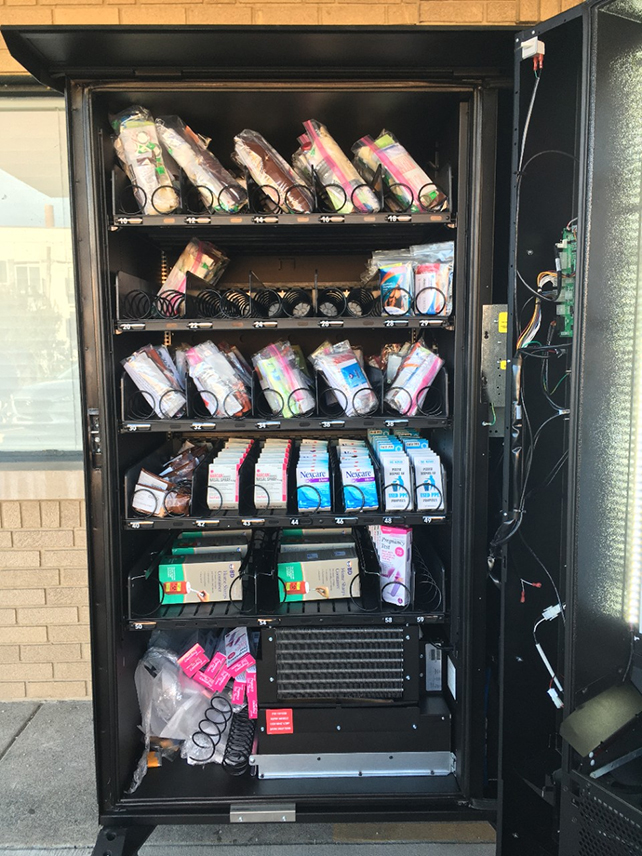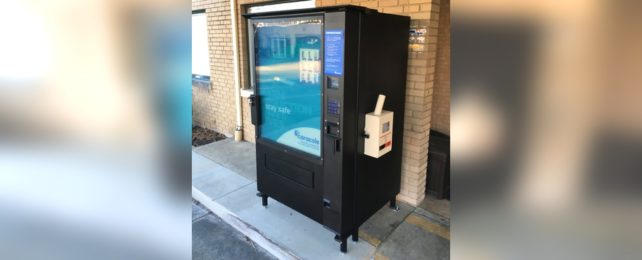They're more often associated with snacks and drinks, but vending machines packed with overdose-reversing drugs have the potential to save lives.
An evaluation by University of Cincinnati clinical pharmacy specialist Daniel Arendt on a single self-service unit set up in Cincinnati, Ohio, concluded such services could dramatically widen access to harm reduction measures.
The machine dispenses naloxone, which can be administered as a nasal spray or as an injection to counter the potentially fatal effects of an opioid overdose.
Other materials that have been put inside the vending machine include containers for disposing of sharp objects (like needles), kits for injecting and smoking more safely, and pregnancy tests and boxes of bandages.

"A cornerstone of harm reduction is to help people who use drugs stay as healthy as possible," says Suzanne Bachmeyer, director of prevention at Caracole, the HIV/ AIDS service organization that was involved in the trial.
"Vending machines provide 24/7 ready access to life-saving and disease prevention supplies so people feel empowered to take control of their health. People can't get healthy or seek treatment if they aren't alive."
The vending machine was placed outside a current in-person Syringe Service Program (SSP) location in February 2021. Those involved in the program, which aims to help those with drug addictions, have to register to gain access to a code for the machine, which is then valid for 90 days. After 90 days, people can enroll again.
A total of 911 people have used the vending machine since it was installed, the researchers report, with nearly 16 percent of those not having used harm reduction services before. The machine has dispensed 3,360 doses of naloxone and 10,155 fentanyl test strips (which can prevent overdoses by detecting the powerful synthetic opioid in other drugs).
The latest numbers from the team suggest that 960 overdoses have been reversed using kits from the machine. More than two-thirds of those who have reenrolled in the program also report finding fentanyl in their drug supply, which in many cases led to them throwing away their drugs or using a lower dose.
More than 107,000 people are thought to have died from a drug overdose in the United States in 2021, with the majority of those down to opioids.
"I think it was really striking to see just how much use it got almost immediately compared to other in-person syringe service programs," says Arendt.
"Recognizing how many people were out there looking for something like this or needing something like this was really surprising."
While similar vending machines have been used in other parts of the world with positive results, the US is catching up. A number of cities and counties have begun installing naloxone-dispensing machines in recent years, though drug safety experts want to see them more widely used.
The idea is not to enable or condone drug use, but to meet people where they are and offer safety measures and other support. The researchers report that the vending machine dispensed more naloxone doses and fentanyl test strips than any other SSP in the county, while attracting people who hadn't previously used harm reduction services before.
Although legal red tape prevented the team from including sterile syringes in the machine, even without this the trial has made a major impact. And while the machine represented a slight improvement in more equitably distributing harm-reduction materials to Black participants than other services in Cincinnati's Hamilton County, Arendt says more work needs to be done.
"If you are interested in stopping, we're here to help," says Arendt.
"But if not, we aren't going to turn you away and refuse to help. We are going to work with you and help you take steps that will help keep you safe."
The research has been published in the Journal of the American Pharmacists Association.
